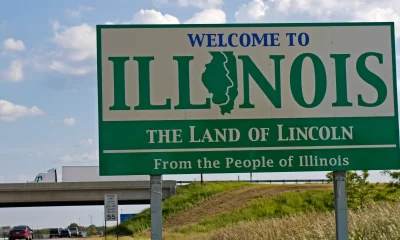Business
Missouri Regulators Draft of Adult-Use Cannabis Rules

State regulators in Missouri released proposed adult-use cannabis regulations on Thursday, only two days after voters legalized recreational marijuana in last week’s midterm elections.
The Missouri Department of Health and Senior Services (DHSS) released proposed regulations to govern adult-use cannabis in the state on Thursday, only two days after voters approved a ballot measure to legalize recreational marijuana.
Missouri voters ended the prohibition on cannabis with the adoption of Constitutional Amendment 3 on November 8, which appeared on the ballot for last week’s midterm elections. More than one million voters decided in favor of the amendment, which received more than 53% of the vote as of Monday morning, with 99% of the vote counted.
The successful amendment to the state’s constitution legalizes the possession, use, sale, and delivery of cannabis for personal use for adults aged 21 and older and sets a 6% tax on commercial cannabis sales. The amendment also includes provisions for the expungement of certain marijuana-related convictions.
Only two days after voters went to the polls, the DHSS released its draft adult-use cannabis regulations and opened up a public comment period to receive feedback on the proposal from interested parties. The public comment period is scheduled to run through Friday, November 25.
The text of Constitutional Amendment 3 stipulates that the measure goes into effect 30 days after passage, which will be December 8. Lyndall Fraker, the director of the medical marijuana section of DHSS, said the agency began preparing the proposed regulations before election day in order to meet the deadline in the event that the ballot measure passed.
“Our legal team has been working on the rules for a few weeks now, so we actually have those ready — the rough draft ready for public display — and I think you’re going to see those in the next day or two and that’s important to get those out there,” Fraker told local media.
License Applications To Be Accepted Starting Next Month
Under the proposal, the health department’s Division of Cannabis Regulation will begin accepting recreational cannabis retailer license applications from the state’s existing medical marijuana dispensaries beginning on December 8. Regulators will then have 60 days to approve license applications, meaning that sales of adult-use cannabis should begin no later than February 2023.
Legal recreational weed sales could begin in Missouri even sooner than that, however. DHSS spokeswoman Lisa Cox told the St. Louis Post-Dispatch that officials expect to convert licenses for medical marijuana dispensaries “before the 60-day deadline, as soon as we have rules for comprehensive facilities filed.”
“We anticipate comprehensive dispensaries will be able to begin selling to adult use consumers as soon as their license is approved for conversion,” Cox said.
Cox noted that the amendment bars the DHSS from issuing any new “comprehensive” licenses to stand-alone recreational marijuana dispensaries “for 548 days after December 8, 2022.”
Jack Cardetti, a spokesman for the Missouri Medical Cannabis Trade Association, said the timing of the proposed rollout “likely means that Missouri will have one of the quickest and smoothest transitions to adult use sales in the nation.”
The regulations call for a total of 192 licenses for combined medical marijuana and “comprehensive” adult-use dispensaries, to be evenly divided among the state’s eight districts. The proposed rules also set a limit of 62 cannabis cultivation facilities and 88 product manufacturers.
Beginning in June 2023, the DHSS would begin to accept applications for up to 144 cannabis microbusinesses. A limit of 48 microbusiness licenses distributed among the state’s eight districts could be approved within the first 270 days, according to the regulations.
Constitutional Amendment 3 also legalizes the home cultivation of cannabis for personal use for adults who obtain a permit from the Division of Cannabis Regulation. Cox said the state “will begin accepting applications for adult use personal cultivation during or before the first week of January.”
Public comments on the proposed regulations for adult-use cannabis regulations in Missouri can be submitted through the DHSS website.
Source: https://hightimes.com/news/missouri-regulators-draft-of-adult-use-cannabis-rules/
Business
New Mexico cannabis operator fined, loses license for alleged BioTrack fraud

New Mexico regulators fined a cannabis operator nearly $300,000 and revoked its license after the company allegedly created fake reports in the state’s traceability software.
The New Mexico Cannabis Control Division (CCD) accused marijuana manufacturer and retailer Golden Roots of 11 violations, according to Albuquerque Business First.
Golden Roots operates the The Cannabis Revolution Dispensary.
The majority of the violations are related to the Albuquerque company’s improper use of BioTrack, which has been New Mexico’s track-and-trace vendor since 2015.
The CCD alleges Golden Roots reported marijuana production only two months after it had received its vertically integrated license, according to Albuquerque Business First.
Because cannabis takes longer than two months to be cultivated, the CCD was suspicious of the report.
After inspecting the company’s premises, the CCD alleged Golden Roots reported cultivation, transportation and sales in BioTrack but wasn’t able to provide officers who inspected the site evidence that the operator was cultivating cannabis.
In April, the CCD revoked Golden Roots’ license and issued a $10,000 fine, according to the news outlet.
The company requested a hearing, which the regulator scheduled for Sept. 1.
At the hearing, the CCD testified that the company’s dried-cannabis weights in BioTrack were suspicious because they didn’t seem to accurately reflect how much weight marijuana loses as it dries.
Company employees also poorly accounted for why they were making adjustments in the system of up to 24 pounds of cannabis, making comments such as “bad” or “mistake” in the software, Albuquerque Business First reported.
Golden Roots was fined $298,972.05 – the amount regulators allege the company made selling products that weren’t properly accounted for in BioTrack.
The CCD has been cracking down on cannabis operators accused of selling products procured from out-of-state or not grown legally:
- Regulators alleged in August that Albuquerque dispensary Sawmill Sweet Leaf sold out-of-state products and didn’t have a license for extraction.
- Paradise Exotics Distro lost its license in July after regulators alleged the company sold products made in California.
Golden Roots was the first alleged rulebreaker in New Mexico to be asked to pay a large fine.
Source: https://mjbizdaily.com/new-mexico-cannabis-operator-fined-loses-license-for-alleged-biotrack-fraud/
Business
Marijuana companies suing US attorney general in federal prohibition challenge

Four marijuana companies, including a multistate operator, have filed a lawsuit against U.S. Attorney General Merrick Garland in which they allege the federal MJ prohibition under the Controlled Substances Act is no longer constitutional.
According to the complaint, filed Thursday in U.S. District Court in Massachusetts, retailer Canna Provisions, Treevit delivery service CEO Gyasi Sellers, cultivator Wiseacre Farm and MSO Verano Holdings Corp. are all harmed by “the federal government’s unconstitutional ban on cultivating, manufacturing, distributing, or possessing intrastate marijuana.”
Verano is headquartered in Chicago but has operations in Massachusetts; the other three operators are based in Massachusetts.
The lawsuit seeks a ruling that the “Controlled Substances Act is unconstitutional as applied to the intrastate cultivation, manufacture, possession, and distribution of marijuana pursuant to state law.”
The companies want the case to go before the U.S. Supreme Court.
They hired prominent law firm Boies Schiller Flexner to represent them.
The New York-based firm’s principal is David Boies, whose former clients include Microsoft, former presidential candidate Al Gore and Elizabeth Holmes’ disgraced startup Theranos.
Similar challenges to the federal Controlled Substances Act (CSA) have failed.
One such challenge led to a landmark Supreme Court decision in 2005.
In Gonzalez vs. Raich, the highest court in the United States ruled in a 6-3 decision that the commerce clause of the U.S. Constitution gave Congress the power to outlaw marijuana federally, even though state laws allow the cultivation and sale of cannabis.
In the 18 years since that ruling, 23 states and the District of Columbia have legalized adult-use marijuana and the federal government has allowed a multibillion-dollar cannabis industry to thrive.
Since both Congress and the U.S. Department of Justice, currently headed by Garland, have declined to intervene in state-licensed marijuana markets, the key facts that led to the Supreme Court’s 2005 ruling “no longer apply,” Boies said in a statement Thursday.
“The Supreme Court has since made clear that the federal government lacks the authority to regulate purely intrastate commerce,” Boies said.
“Moreover, the facts on which those precedents are based are no longer true.”
Verano President Darren Weiss said in a statement the company is “prepared to bring this case all the way to the Supreme Court in order to align federal law with how Congress has acted for years.”
While the Biden administration’s push to reschedule marijuana would help solve marijuana operators’ federal tax woes, neither rescheduling nor modest Congressional reforms such as the SAFER Banking Act “solve the fundamental issue,” Weiss added.
“The application of the CSA to lawful state-run cannabis business is an unconstitutional overreach on state sovereignty that has led to decades of harm, failed businesses, lost jobs, and unsafe working conditions.”
Business
Alabama to make another attempt Dec. 1 to award medical cannabis licenses

Alabama regulators are targeting Dec. 1 to award the first batch of medical cannabis business licenses after the agency’s first two attempts were scrapped because of scoring errors and litigation.
The first licenses will be awarded to individual cultivators, delivery providers, processors, dispensaries and state testing labs, according to the Alabama Medical Cannabis Commission (AMCC).
Then, on Dec. 12, the AMCC will award licenses for vertically integrated operations, a designation set primarily for multistate operators.
Licenses are expected to be handed out 28 days after they have been awarded, so MMJ production could begin in early January, according to the Alabama Daily News.
That means MMJ products could be available for patients around early March, an AMCC spokesperson told the media outlet.
Regulators initially awarded 21 business licenses in June, only to void them after applicants alleged inconsistencies with how the applications were scored.
Then, in August, the state awarded 24 different licenses – 19 went to June recipients – only to reverse themselves again and scratch those licenses after spurned applicants filed lawsuits.
A state judge dismissed a lawsuit filed by Chicago-based MSO Verano Holdings Corp., but another lawsuit is pending.
Source: https://mjbizdaily.com/alabama-plans-to-award-medical-cannabis-licenses-dec-1/
-

 Business2 years ago
Business2 years agoPot Odor Does Not Justify Probable Cause for Vehicle Searches, Minnesota Court Affirms
-

 Business2 years ago
Business2 years agoNew Mexico cannabis operator fined, loses license for alleged BioTrack fraud
-

 Business2 years ago
Business2 years agoAlabama to make another attempt Dec. 1 to award medical cannabis licenses
-

 Business2 years ago
Business2 years agoWashington State Pays Out $9.4 Million in Refunds Relating to Drug Convictions
-

 Business2 years ago
Business2 years agoMarijuana companies suing US attorney general in federal prohibition challenge
-

 Business2 years ago
Business2 years agoLegal Marijuana Handed A Nothing Burger From NY State
-

 Business2 years ago
Business2 years agoCan Cannabis Help Seasonal Depression
-

 Blogs2 years ago
Blogs2 years agoCannabis Art Is Flourishing On Etsy











